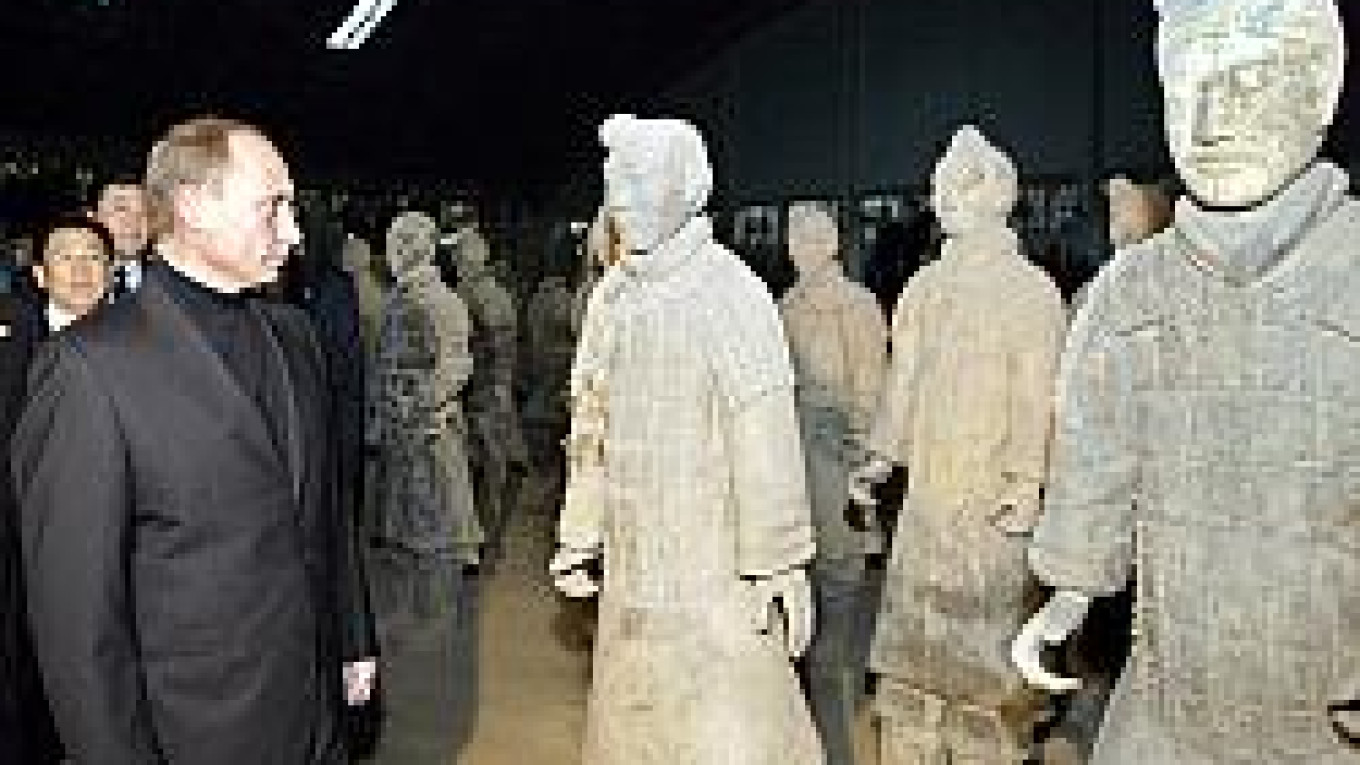Chinese President Hu Jintao reportedly expected some reciprocity for officially backing Moscow's bid to join the World Trade Organization, promising to invest nearly $1 billion per year into Russia's economy through 2020, and ending a border dispute that had lingered for nearly half a century.
If so, however, he was mistaken.
Aside from what Putin called "new opportunities for growing bilateral cooperation," the visit, which included chief executives of several major companies, produced little of substance -- at least publicly.
The main issue for China, which is now the world's second-largest crude importer after the United States, is to secure oil and gas supplies from its resource-rich northern neighbor. But no progress was made on two key planks of Beijing's strategy -- an $18 billion, 5,000-kilometer gas link from the massive Kovykta field in eastern Siberia, first proposed nearly a decade ago, and a 2,500-kilometer oil link from western Siberia to the heart of China's refining industry.
Officials at CNPC, China's leading oil and gas firm, were "confident" that Putin would approve the gas link during his talks with Hu, who raised the issue personally, The New York Times reported, citing two Western energy executives familiar with the talks.
Instead, however, all CNPC got was a vague agreement on cooperation with Gazprom, the world's largest gas company.
The bigger issue for China at the moment, however, is the oil pipeline. With demand for crude growing at nearly 15 percent per year and supplies from the Middle East increasingly tenuous, Beijing is anxious for a pipeline that would run from Angarsk, a town near the southern tip of Lake Baikal, to the Chinese oil city of Daqing.
Russia has every intention of building a pipeline to move western Siberian crude to Asia, but appears to be favoring a rival route backed by Japan. That route, for which the Japanese have offered $7 billion in loans, would bypass China and terminate in the port town of Nakhodka on the Sea of Japan.
The Nakhodka route would make more sense, economists say, as it would allow Russia to ship oil to more countries, including the United States. It would also leave open the possibility of building a spur to Daqing.
"China has a shortage of energy resources, which is why we are very interested in the construction of the pipeline to Daqing," said Hu Wenmin, co-chairman of the Russia-China business council. "If Russia agrees to building a pipeline to China, it will find the most reliable, long-term and secure customer and partner," Hu told Interfax.
Prior to flying to Beijing, Putin told Chinese reporters that the decision had to be made based primarily on "Russia's national interests."
Economic Development and Trade Minister German Gref, who accompanied Putin on the trip, appeared to keep the Chinese at arm's length Thursday by suggesting that the only decision left to make is whether to build the spur to Daqing after a pipeline to Nakhodka is completed.
Interfax quoted an unnamed senior government official as saying in Beijing that the route Russia chooses is strictly an internal matter.
"We understand the interest China has in long-term cooperation with Russia on energy resources," the official said. "[But] making such a serious decision requires time, money and environmental expertise."
Other negotiators who traveled with Putin made more headway.
Yevrazholding, Russia's largest steelmaker, said it is pushing forward with plans to build a plant in China.
"We are interested in building a plant either with Chinese companies or ourselves and would like to fulfill this project as soon as possible," Yevrazholding chief Alexander Abramov was quoted by Interfax as saying.
State-owned banking giant Vneshtorgbank said it had secured a $200 million line of credit from China's Agriculture Bank to finance imports of Chinese durable goods.
It was not clear whether Russia struck any deals or agreements in the arms industry with China, its biggest customer. Sergei Chemezov, the head of state arms exporter Rosoboronexport, was part of the delegation, but he made no public statements.
French President Jacques Chirac signed a $4 billion protocol agreement with China in Beijing just days before Putin's trip, raising some concerns that Russia may have to compete harder for one of its most lucrative export businesses. But a senior government official dismissed those concerns, saying the French have no chance of cutting in on Russia's market.
"For Russia, such cooperation [between France and China] is not a tragedy. Russia took over this niche a long time ago ... and we have big plans," Interfax quoted the official as saying.
A Message from The Moscow Times:
Dear readers,
We are facing unprecedented challenges. Russia's Prosecutor General's Office has designated The Moscow Times as an "undesirable" organization, criminalizing our work and putting our staff at risk of prosecution. This follows our earlier unjust labeling as a "foreign agent."
These actions are direct attempts to silence independent journalism in Russia. The authorities claim our work "discredits the decisions of the Russian leadership." We see things differently: we strive to provide accurate, unbiased reporting on Russia.
We, the journalists of The Moscow Times, refuse to be silenced. But to continue our work, we need your help.
Your support, no matter how small, makes a world of difference. If you can, please support us monthly starting from just $2. It's quick to set up, and every contribution makes a significant impact.
By supporting The Moscow Times, you're defending open, independent journalism in the face of repression. Thank you for standing with us.
Remind me later.


